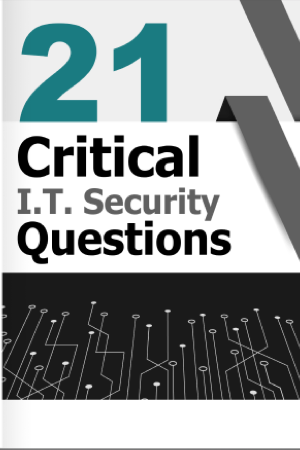 Tax season is already stressful enough — sorting through financials, filing returns, and meeting deadlines. But while you’re focused on crunching numbers, cybercriminals are laser-focused on stealing your data, intercepting payments, and tricking your employees into costly mistakes.
Tax season is already stressful enough — sorting through financials, filing returns, and meeting deadlines. But while you’re focused on crunching numbers, cybercriminals are laser-focused on stealing your data, intercepting payments, and tricking your employees into costly mistakes.
Hackers love tax season because businesses are distracted, email inboxes are overflowing, and sensitive financial information is flying back and forth between accountants, payroll providers, and the IRS. If you’re not careful, one wrong click could lead to fraud, data breaches, or ransomware attacks.
Here’s why cybercriminals target businesses during tax season and how you can fight back.
Why Tax Season Is Prime Time for Cybercrime
1. More Sensitive Data Moving Around
Tax season requires businesses to share financial records, Social Security numbers, bank account details, and employee data. With so much sensitive information being exchanged, one phishing email or fake invoice can easily slip through the cracks.
2. Tight Deadlines = Costly Mistakes
When employees are rushing to meet tax deadlines, they’re less likely to double-check emails, links, and payment requests. Hackers exploit this urgency by sending fake tax-related messages that look legitimate.
3. A Flood of Emails Means More Opportunities for Scams
During tax season, inboxes are packed with emails from accountants, payroll providers, and tax agencies. Cybercriminals take advantage by sending fraudulent emails impersonating the IRS, tax firms, or financial institutions.
4. Scams Specifically Targeting Taxpayers
Hackers pretend to be the IRS, claiming you owe back taxes or need to verify information immediately. They may also impersonate your accountant or bookkeeper, requesting sensitive data or urgent wire transfers.
The Most Common Tax Season Cyber Threats
- Phishing Emails – Scammers pose as the IRS, your accountant, or payroll providers to trick employees into sharing login credentials or downloading malware.
- Fake Invoices & Payment Requests – Fraudulent requests for wire transfers, tax payments, or "urgent" financial actions.
- Ransomware Attacks – Hackers encrypt your financial data and demand a ransom to restore access.
- Social Engineering Scams – Cybercriminals call or email pretending to be accountants, tax consultants, or even your bank to extract sensitive information.
How to Protect Your Business This Tax Season
1. Train Your Team to Spot Red Flags
Your employees are your first line of defense. Educate them on how to identify phishing scams and suspicious activity. Make sure they:
✅ Verify email senders before clicking on links or opening attachments.
✅ Never share sensitive financial information via email.
✅ Be wary of "urgent" requests for payments or account updates.
✅ Report any suspicious emails immediately to your IT team.
2. Secure Your Financial Communications
Email is not secure for sending financial documents. Instead:
✅ Use encrypted portals or secure file-sharing platforms.
✅ Require multi-factor authentication (MFA) for tax-related accounts.
✅ Implement email filtering to block suspicious messages before they reach employees.
3. Lock Down Your Accounts with Multi-Factor Authentication (MFA)
Even if hackers steal a password, MFA can stop them from accessing your accounts. If your financial platforms, tax software, or email provider offer MFA, enable it now.
4. Conduct a Cybersecurity Checkup
Hackers exploit outdated systems. Before tax season kicks into high gear, schedule an IT security audit to:
✅ Ensure your software and systems are up to date.
✅ Check for vulnerabilities in your network security.
✅ Verify that your backup systems are running smoothly.
5. Double-Verify All Financial Transactions
Before processing any payments or data requests:
✅ Confirm with a phone call to a trusted contact.
✅ Look out for suspicious email domains or misspellings.
✅ Be cautious of sudden changes in payment instructions.
Don’t Let Cybercriminals Win This Tax Season
Tax time should be about filing returns, not fighting off hackers. The good news? A few simple cybersecurity measures can protect your business from costly scams.
Is Your Business Cyber-Secure?
Don’t wait until a cyberattack hits — get proactive. Schedule a FREE Network Assessment to uncover security gaps before hackers find them.
Click here to book your FREE Network Assessment today!
Stay secure, stay smart, and let’s keep cybercriminals out of your tax season!



